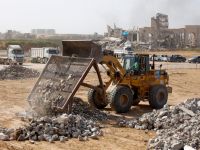However, a number of contractors and businessmen do not see a near end to the problem. The sources recalled the announcement recently by Tihama Cement Factory that it had started the experimental operation of its second line of production and would daily infuse in Makkah region about 5,000 tons of cement. The sources said, when added to the same quantity coming from Al-Safwah Factory, the problem would be eased. They explained that this quantity of 10,000 tons would be allotted to the western region.
Talking to Arab News, Saleem Al-Harbi, chairman of Manar Construction Company and a member of the board of directors of Jeddah Chamber of Commerce and Industry, did not believe that these quantities would be enough to stabilize the cement market in the province. “A number of giant projects are currently being implemented in Makkah, Mina and Jeddah. These quantities of cement will be inadequate to meet their demands,” he said. Al-Harbi, however, considered the new quantities of cement that were brought to the region a compromise solution at the moment. “These quantities must be increased in the future to meet the demands of the ongoing mega projects in Makkah and Jeddah,” he said. Abdul Rahman Fakeeh, chairman of Jabal Omar Company, said the shortage of cement and its high prices had adversely affected the implementation of constructional and development projects in the region, especially Jabal Omar Project, which included about 32 housing towers and five-star hotels. He said the instability of the cement market drove him to shift the implementation of the project to another private company.
Prince Abdul Rahman bin Masaad, chairman of the Southern Cement Company, has said the second production line of the Tihama factory included a furnace with a designed capacity of 5,000 tons of clinker and a cement mill with a capacity of 140 tons an hour in addition to four electricity generators with a combined capacity of 32 megawatts. “Through its two production lines, the factory will daily produce 10,000 tons of clinker and 11,000 tons of cement,” he said. The chairman reiterated that the factory would work full swing if Aramco steadily provided it with fuel. “It will then be able to contribute to resolving the problem of cement shortage,” he said. He noted that the demand for cement in the Kingdom increased by more than 12 percent during the period 2001-2011. The prince said through effective cooperation with the Ministry of Commerce, the company was able to contribute to containing the problem of cement shortage with its three factories in Jazan, Bisha and Tihama, which together produce 24,000 tons of clinker daily.
Minister of Commerce and Industry Tawfiq Al-Rabiah told a local daily recently that the Al-Safwah factory injected about 5,000 tons of cement (100,000 bags) in Makkah region last week. He expected the current crisis to come to an end very soon. The minister said the Ministry of Petroleum and Mineral Wealth was currently considering the establishment of a number of new cement factories. Meanwhile, an official from the Saudi Council of Chambers has warned that the execution of a number of public and private construction projects in various parts of the Kingdom could be delayed as the shortage in supply of cement is likely to deepen further over the next two years. “Work on a number of constructional projects has been delayed due to a lack of sufficient quantities of cement,” Saad Al-Mabti, member of the committee of national contractors at the Saudi Council of Chambers, told Al-Eqtisadiah daily. He warned that if the crisis continues, many contractors might withdraw from these projects. “We received complaints from a number of contractors implementing road and building projects that the shortage of cement was jeopardizing the execution of the projects and might drive them to quit,” he said.
Al-Mabti noted that some contractors had not received their daily cement quotas for more than three weeks. According to Al-Mabti, the crisis has extended to the western, eastern and southern parts of the Kingdom with the latter being the most affected despite the existence of many cement factories. He said the owners of cement factories claimed they were unable to produce at full capacity due to the inadequate quantities of fuel given to them. “If the factories were able to produce with full capacity, there would not be any shortage in cement,” he added. Al-Mabti warned that a number of private projects were facing serious threats and might completely stop work if contractors were not give the amount of cement they required. He said many government and private projects have already been affected when contractors failed to meet deadlines. “The contractors cannot bear to keep their equipment and manpower on the sites idle and they may finally be forced to withdraw,” he cautioned. Al-Mabti noted that mega projects were the said the Council of Chambers held a series of ongoing meetings with the Commerce Ministry and the owners of the cement factories in a bid to find a solution to the crisis.








